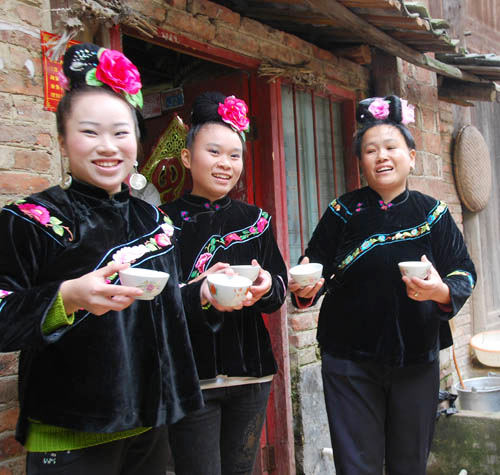|
 |
|
WELCOME: Yang Fufa (right) and her relatives greet guests with home-made rice liquor to celebrate the Miao New Year and the Guzang Festival in Ganjiao Village of Leishan County, southwest China's Guizhou Province, on November 9 (CHEN RAN) |
Besides tourists who are interested in the Miao culture like the Liaos, local people value and cherish their traditional festival celebrations as well.
Tang Luqiang, 23, lives in Ganjiao Village of Danjiang Town. In order to reduce his parents' financial burden, he chose to work in Guangzhou City in south China's Guangdong Province after finishing junior middle school.
Tang asked for a one-month leave to celebrate the Miao New Year and the Guzang Festival with family and friends.
"I am happy to get back home for the celebration," Tang told Beijing Review. "I hope I can earn more money this New Year."
Tang's uncle Yang Shengxiang, 38, returned home two days before the Guzang Festival. Settling down in Guangzhou since 1997, Yang's memory about his very first festival 26 years ago remains fresh in his mind.
"Life was tough at the time. Mom and I had to sit on the back of a donkey to celebrate the Guzang Festival at my uncle's," Yang recalled. "We saved money for a long time to buy festival gifts like duck and fish."
"Our life is getting better now. People get back to the village by automobile. But our culture and tradition have been well preserved and passed down from generation to generation," he continued.
Leishan County has hosted the annual Miao New Year celebrations since 2000. The local government initiated rural ethnic cultural tourism through branding. A series of events was organized, including singing, dancing, ethnic fashion pageants, feasts, and silver jewelry displays, to better present Miao culture. According to statistics from the local government, 1.73 million people visited the county in 2010, bringing in 648 million yuan ($92.6 million) in tourism.
"I think the meaning behind the celebration of Miao New Year and the Guzang Festival is far more important than hosting the Olympic Games," Yang noted. "It is a manifestation of cultural values."
"The well-preserved ethnic culture becomes more valuable, particularly in the era of rapid economic development," he added.
(Reporting from Leishan County, Guizhou Province) | 